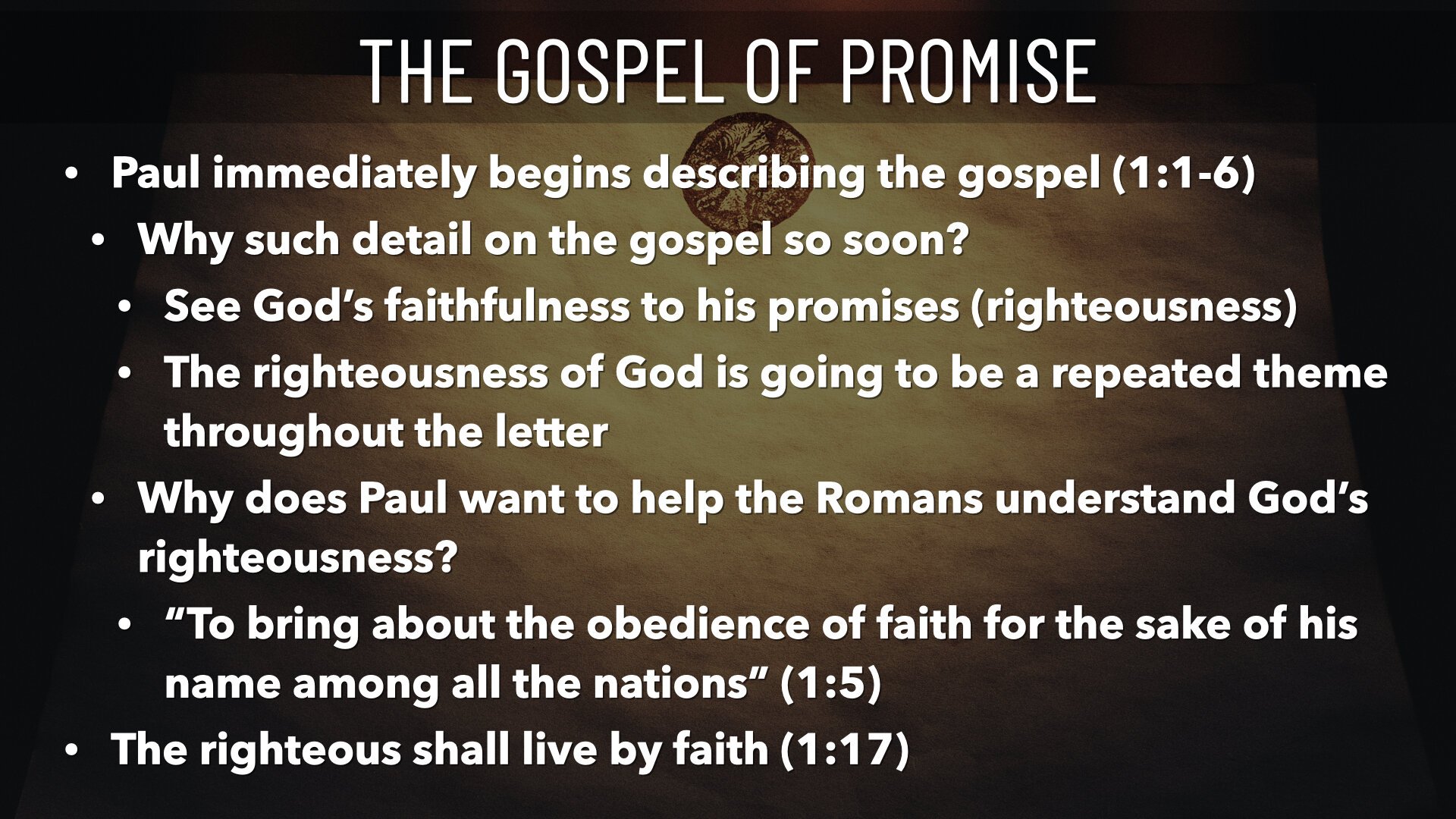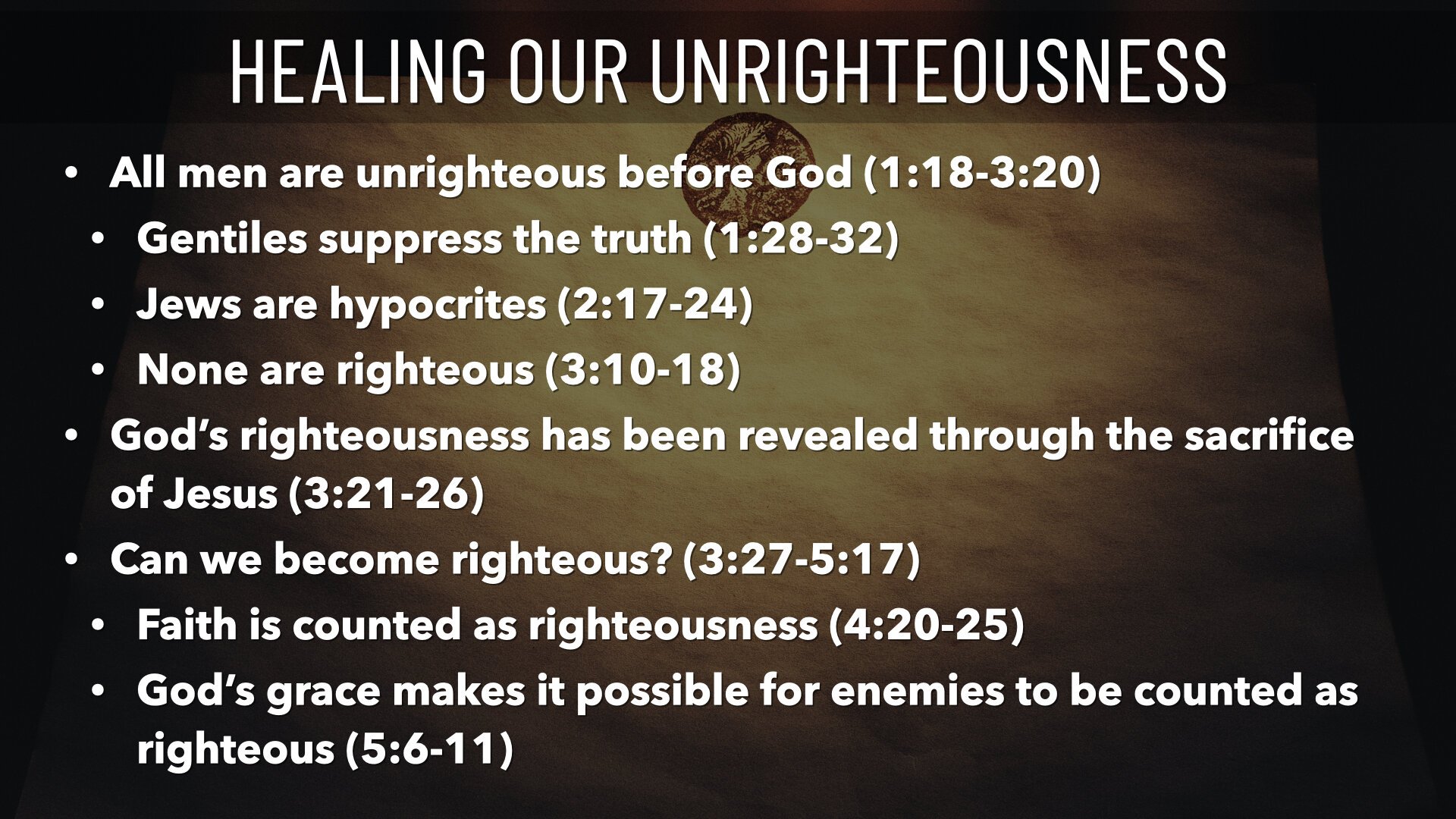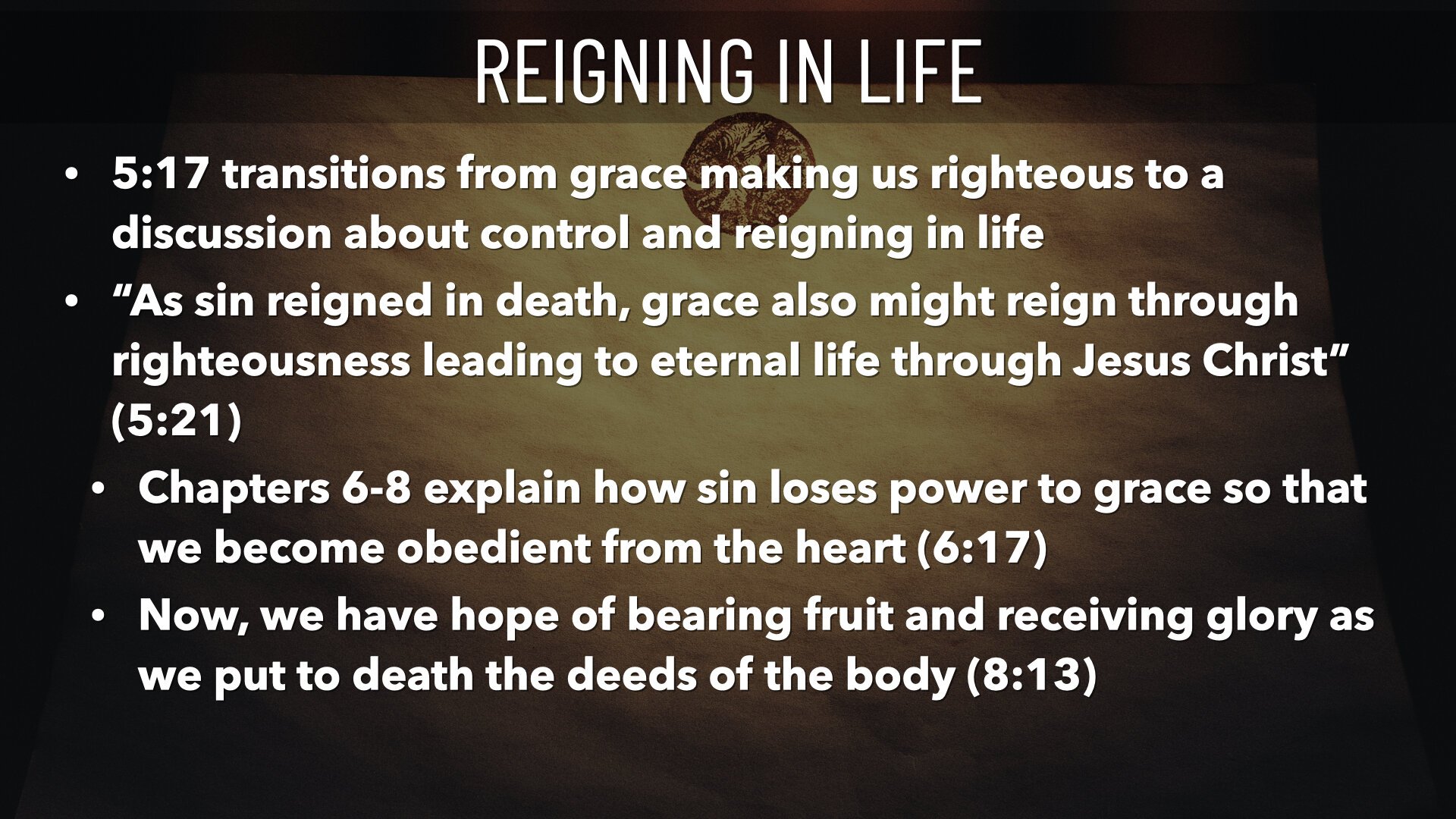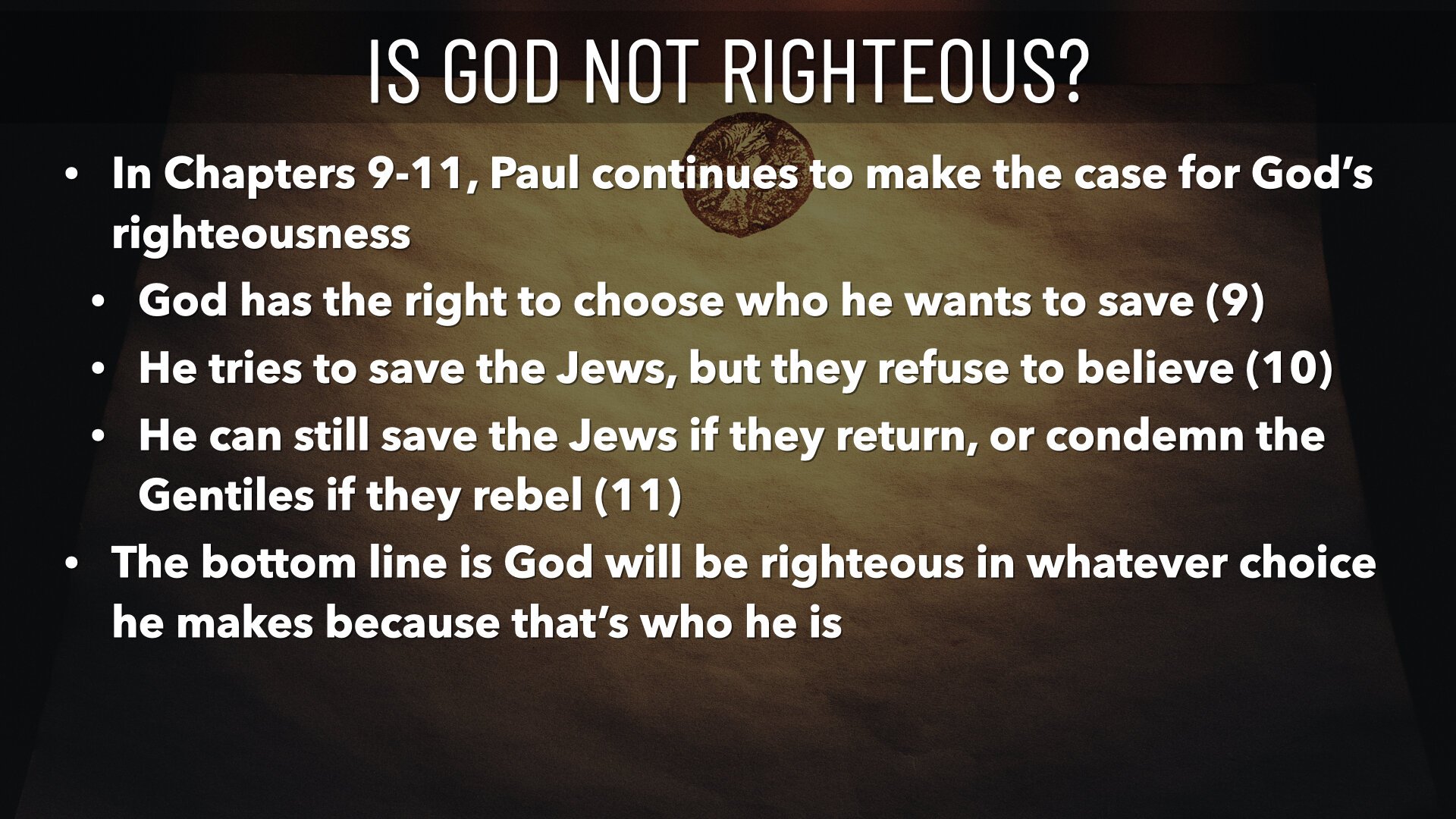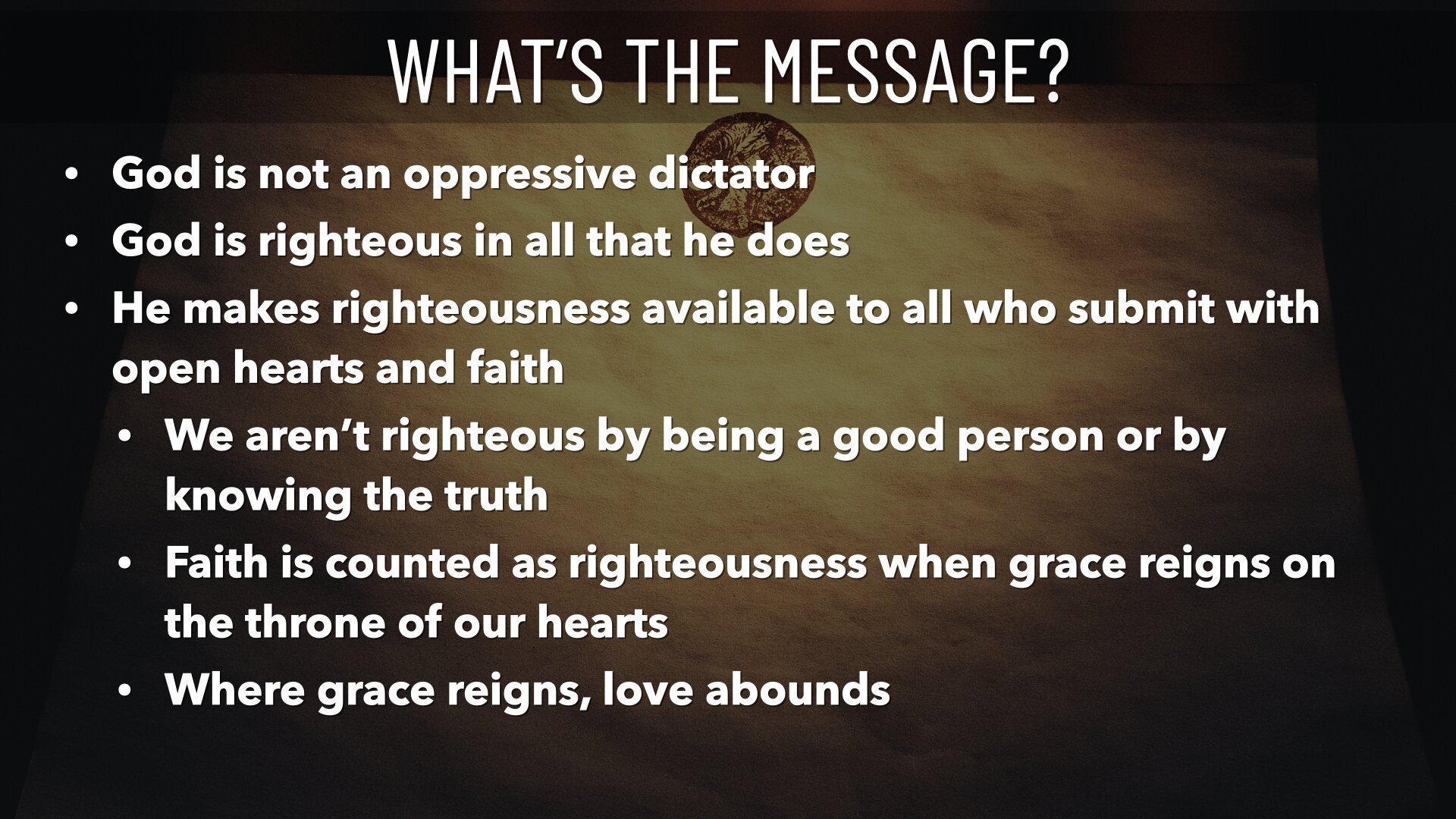God is Righteous (Romans)
Romans is a book about God. Paul starts off the book with an odd introduction.
Romans 1:1--6 (ESV) --- 1 Paul, a servant of Christ Jesus, called to be an apostle, set apart for the gospel of God, 2 which he promised beforehand through his prophets in the holy Scriptures, 3 concerning his Son, who was descended from David according to the flesh 4 and was declared to be the Son of God in power according to the Spirit of holiness by his resurrection from the dead, Jesus Christ our Lord, 5 through whom we have received grace and apostleship to bring about the obedience of faith for the sake of his name among all the nations, 6 including you who are called to belong to Jesus Christ,
Notice how much is said as Paul introduces himself. This is not a running list of his accomplishments or a further description of who Paul is. This is a condensed summary of the gospel. Why would Paul talk about the gospel as he introduces the letter?
There are two really interesting things he does as he describes the gospel. First, he tells us that it is the fulfillment of God's promise. We have been talking a lot about the promises of God this year. The gospel is the ultimate promise of salvation being fulfilled. But why talk about it in this way, and why bring it up at the first of the letter? Paul wants us to see God's faithfulness from the opening sentence of this letter. This brings me to the theme of the whole book. The book of Romans tells us that God is righteous. That means that he always does what is right. The word righteousness is used 36 times in the book of Romans, and the word righteous appears 12 times. Throughout this book, Paul will be talking about righteous God is, and he starts by telling us that God keeps his promises.
Now, what is the second interesting thing we find in this introduction? Paul brings up the mission of his apostleship. He says the apostles are trying to "bring about the obedience of faith for the sake of his name among all the nations." This points to the second significant idea in this book. Since God is righteous, what should we do as his image-bearers? If we were created in the image of God, we must develop an obedient faith that glorifies his name. So, the book of Romans tells us that God is righteous. Then, it explains how God's righteousness has transformed us to be righteous like he is righteous.
Now, let's see how Paul explains all of this in the key passage.
Romans 1:16--17 (ESV) --- 16 For I am not ashamed of the gospel, for it is the power of God for salvation to everyone who believes, to the Jew first and also to the Greek. 17 For in it the righteousness of God is revealed from faith for faith, as it is written, “The righteous shall live by faith.”
Paul says that the gospel is the power of God to save everyone who believes. Then, he says that the gospel reveals the righteousness of God from faith to faith. The ESV says, "From faith for faith," but I think Paul refers to the passing of salvation from one person to another as they demonstrate faith. The spread of faith through the telling of the gospel is the spread of salvation to mankind. That's what I believe Paul is pointing us to. So in this key phrase, we have both major themes. We see the righteousness of God revealed and the faithful obedience of mankind. The righteous shall live by faith indicates that those who have faith are declared righteous by God's grace.
Now, if you understood all of that, you know the main thread of the book of Romans (God is righteous, and his grace transforms us to be obedient, faithful, and righteous). If all of that sounded a little vague, and you want more detail, I'm going to try to summarize the rest of the book.
Beginning With Unrighteousness (1:18-3:20)
After Paul tells us the bottom line up front, he goes back to the basics. The rest of Chapter 1, all of Chapter 2, and some of Chapter 3 tell us that mankind is not righteous like God. In Chapter 1, he tells us about the unrighteousness of the Gentiles. They suppress the truth and refuse to believe what is evident. So God gives them up to do all kinds of evil.
Romans 1:28--32 (ESV) --- 28 And since they did not see fit to acknowledge God, God gave them up to a debased mind to do what ought not to be done. 29 They were filled with all manner of unrighteousness, evil, covetousness, malice. They are full of envy, murder, strife, deceit, maliciousness. They are gossips, 30 slanderers, haters of God, insolent, haughty, boastful, inventors of evil, disobedient to parents, 31 foolish, faithless, heartless, ruthless. 32 Though they know God’s righteous decree that those who practice such things deserve to die, they not only do them but give approval to those who practice them.
In Chapter 2, Paul points out the unrighteousness of the Jews. They judge people based on the law of God, but they do not keep it. They do all the same sins as everyone else, but they justify their sins and claim that they are righteous.
In Chapter 3, Paul says that all are sinful. There is not one righteous man walking on the whole earth.
Romans 3:10--18 (ESV) --- 10 as it is written: “None is righteous, no, not one; 11 no one understands; no one seeks for God. 12 All have turned aside; together they have become worthless; no one does good, not even one.” 13 “Their throat is an open grave; they use their tongues to deceive.” “The venom of asps is under their lips.” 14 “Their mouth is full of curses and bitterness.” 15 “Their feet are swift to shed blood; 16 in their paths are ruin and misery, 17 and the way of peace they have not known.” 18 “There is no fear of God before their eyes.”
God's Righteousness Revealed (3:21-26)
After telling us how unrighteous we are, Paul reveals how righteous God is. He saved us through the gift of Jesus Christ. Jesus became the atoning sacrifice for our sins (that's what propitiation means). God is so righteous that he paid the debt of our sins with his son's precious and sinless blood. Through this one act, he did for us what we could not do for ourselves. He made the unrighteous who put their faith and trust in him righteous. This is the gospel that we received and the best possible news we could ever receive.
Can We Be Righteous? (3:27-5:17)
If all of our sins are removed, doesn't that make us righteous like God is righteous? At that point, there is nothing righteous about us other than what God has done for us. Paul says, "We have no grounds to boast." It's not like we kept the law perfectly and became righteous like God. But there is a new opportunity given to us. Forgiveness of sins allows us to become righteous in God's sight.
But it's not like we would think. We would think that we can bear fruit for God by doing the works of the law. In Chapter 4, Paul tells us that Abraham was counted righteous by simply having an obedient faith. Abraham found favor with God outside of any law by believing God's promises and acting in accord with what God said. Abraham seems to be a good man. He hides his identity from evil kings, but he seems to be a good man. But we know that he is guilty of sin like the rest of us. God saw the faith of Abraham and let that faith count as righteousness.
Romans 4:20--25 (ESV) --- 20 No unbelief made him waver concerning the promise of God, but he grew strong in his faith as he gave glory to God, 21 fully convinced that God was able to do what he had promised. 22 That is why his faith was “counted to him as righteousness.” 23 But the words “it was counted to him” were not written for his sake alone, 24 but for ours also. It will be counted to us who believe in him who raised from the dead Jesus our Lord, 25 who was delivered up for our trespasses and raised for our justification.
In the same manner, our faith is counted to us as righteousness. When we believe in the gospel and act in accord with God's word, we are placing our hope in the promises of God. Then, we can be counted as righteous.
Chapter 5 tells us that God gave his enemies a way to please him through the sacrifice of Jesus. He poured his love into our hearts so that we would rejoice with faith in the promises of God. No one can ever doubt that God is righteous after he has offered his enemies the "free gift of righteousness" through faith in Jesus Christ.
But there is more...
Reigning In Life (5:17-8:39)
Chapter 5:17 begins a deep discussion. At this point, the whole book gets intense. Paul's explanation of our opportunity in Christ expands to include a fundamental idea that many Christians fail to understand or take advantage of. We could spend hours "geeking out" on this. However, my goal in this lesson is not to fill you with the deep theological riches found in this book. I have to save that for another time. My goal is to simplify and explain what Paul says without oversimplifying it. Wish me luck...
The key to understanding this section is through carefully reading 5:17.
Romans 5:17 (ESV) --- 17 For if, because of one man’s trespass, death reigned through that one man, much more will those who receive the abundance of grace and the free gift of righteousness reign in life through the one man Jesus Christ.
What does this text mean? It tells us that before Christ, death reigned. But now, "those who receive the abundance of grace and the free gift of righteousness reign in life through the one man Jesus Christ." If you understand what this is saying, you will know what Chapters 6, 7, and 8 are all about. When we receive the free gift of righteousness, we are set free from sin and death. We can live totally free from the burden of our past mistakes. At this point, we get to decide where we go and what we do without considering how we will make up for past mistakes. We "reign in life." The chains of law do not bind us.
Romans 5:20--21 (ESV) --- 20 Now the law came in to increase the trespass, but where sin increased, grace abounded all the more, 21 so that, as sin reigned in death, grace also might reign through righteousness leading to eternal life through Jesus Christ our Lord.
Notice something remarkable in this text. He says that God set us free so that "grace might reign through righteousness leading to eternal life." At this point, we can see ourselves totally free to choose which way we will go. Before, we were condemned in our sin. Now, we get to decide. Do we let sinful passions reign our life and die for eternity, or does the grace of God prick our hearts so that we want to do whatever God wants us to do?
This is the basis of Chapters 6-8. Paul wants to Romans to know that they now have the power to choose who they will serve. They can choose sin and death, or they can choose the Spirit and life. It's not much of a choice. We are now free to choose the Spirit of life, and because we choose that, we can bear fruit for God, become instruments of righteousness that glorify him, and have total security in Christ.
This also means that God doesn't expect us to rise out of the waters of baptism magically able to do all that the law says. He expects us to choose his ways from that point. If our heart desires to do his will, we will put to death the sinful ways and become more like him. We will stop gratifying the desires of our flesh and start living for God. Sin will not control us. We will submit to God and find transformation.
Is God Not Righteous? (9-11)
In chapter 9, Paul starts to discuss God's righteousness again. This time, he makes it clear that God could choose to save whoever he wants. It is totally up to him. He is the one saving us, so who are we to question his criteria for salvation? This is a response to the Jews who disapprove of Gentile Christians. Counting faith as righteousness doesn't go over well for Israelites who think they are keeping the law better than anyone.
In Chapters 10 and 11, he states that God has reached out to the rebellious Jews, but they refuse to have faith. They have their own form of unrighteousness in their prideful, stubborn hearts. He is righteous, and we would do well to accept his grace for all with joy. He will accept all who turn from rebellion with faith in Jesus' sacrifice.
Applying God's Righteousness (12:1-15:12)
Then, Paul points out that those who are receiving God's mercies must extend mercy to others. Chapters 12-15 tell us that grace reigning in our lives means we love one another with genuine affection. We don't pass harsh judgments on each other. We aren't stubborn and rebellious toward those in authority. We follow the example of Christ and display faith in the life to come.
Conclusion (15:13-16:27)
The book's end is a little extended because Paul wants to explain his plans and greets people he knows. Let's read the last words of the book.
Romans 16:25--27 (ESV) --- 25 Now to him who is able to strengthen you according to my gospel and the preaching of Jesus Christ, according to the revelation of the mystery that was kept secret for long ages 26 but has now been disclosed and through the prophetic writings has been made known to all nations, according to the command of the eternal God, to bring about the obedience of faith--- 27 to the only wise God be glory forevermore through Jesus Christ! Amen.
Do you see how this is a book about God's righteousness and how that righteousness affects us?
What's The Message?
Imagine living in a world ruled by an evil, oppressive dictator. He is selfish and greedy, doing what he wants when he wants. He lies and cheats to get you to work harder for him and keep you from getting what you want. Life would be a constant dose of suffering and pain without any real hope of getting out. Imagine working seven days a week, twelve hours a day without holidays or breaks. Imagine if you don't work, you don't eat. Or worse, if you don't work, you get beaten.
This is not the God we serve. We serve a God who is tender and compassionate. He is kind and loving. He makes promises and always delivers. But he doesn't make those promises and fulfill them because we did something so good. He does this because he is good. That's just who he is. But God has done all of this with a purpose in mind. He created us to begin with so that we might bring glory to his name. He is providing us with everything we need to become what we were created to be.
Application
If we want to do what this letter tells us to do, we must stop putting our trust in ourselves to be righteous. Instead, we should accept the new means of righteousness God has given us through faithful obedience. We aren't righteous because we keep the law. We aren't proud or stubborn. We submit with open hearts. We let grace reign on the thrones of our hearts, and we take sin off the throne. The passions and lusts of sin can have no place in us because we have received grace greater than our sin.
Conclusion
The book of Romans is a deep and complicated book to study in-depth. There are sections of the book that we have to read repeatedly to grasp what is being said fully. But the overall message is clearly understood. Our God is righteous and full of compassion toward all of mankind. He has made way for every one of us to stand justified in his sight, completely free of guilt, through the blood of Jesus. All we have to do is accept the gift and respond with a submissive heart. If we will give in to the will of God and put to death the passions and desires for sin, we can find rest in God's promises. He always fulfills his promises.


